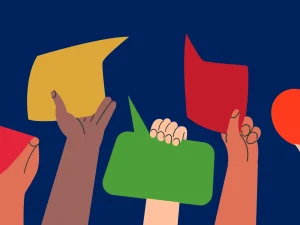As Children’s Commissioner hearing from children directly about issues they care about is one of the biggest privileges of my role. In today’s increasingly connected world, issues facing children in England are often those that impact children globally – and discussing those issues with children both here and abroad is an important part of my work.
October marks Period Poverty Action Day. My Youth Ambassador, Ariana, wanted to share her concerns about period poverty:
“All over the world, women and girls are affected by period poverty. This is the lack of access to menstrual products, safe and hygienic spaces to use them, and the freedom to manage periods without shame or stigma. This isn’t just an issue of comfort or convenience. Across the world, it can be a matter of health, dignity, and equality.
For millions, the basic essentials to manage menstruation simply don’t exist and when that happens, the effects on girls’ education, mental health – even their futures – are huge.
Period poverty means being unable to afford or access the products and facilities needed to manage menstruation safely and with dignity. The World Bank estimates that at least 500 million women and girls globally lack access to the facilities they need to manage their periods. Around 1.25 billion women and girls have no access to a safe, private toilet, and 526 million have no toilet at all.
This lack of access can lead to girls missing school, facing health risks, or even being excluded from parts of community life. It’s not just a problem in low-income countries in other parts of the world. It can happen here in the UK too.
Menstruation is a normal, healthy part of life, but it can also bring real challenges. Many of us grow up feeling that periods are something we shouldn’t talk about — something to hide. This silence, known as period stigma, makes it harder for girls to seek help or speak openly about what they need.
ActionAid reports that over a quarter of young women aged 16–24 in the UK have felt anxious about being on their period in the last year. It’s shocking that in 2025, something so natural is still a source of embarrassment and stress.
Then there’s the financial burden. On average, women in the UK spend around £10 a month on sanitary products. It’s money that men don’t have to spend and, for students like me or families already struggling with bills or rent, that can be a real challenge.
Across the world, when people can’t afford products, they often have to resort to unsafe alternatives which can mean using sanitary products for too long or even replacing them with rags or paper. This can lead to serious health problems, like toxic shock syndrome, infections and long-term reproductive issues.
So, my question is: why aren’t period products free for everyone who needs them?
Taking action is possible and a few things have already happened to prove that. For example, in 2020, Scotland passed the ‘Period Products (free) Provision Act’ to ensure that free sanitary products are available in all public places. This allowed women to easily access these products when needed. In the same year, England launched a programme delivering free period products to schools and colleges so that having a period is not a barrier to education for any child – that scheme continues to run.
Also in 2020, tax was removed from period products – the so called ‘tampon tax’ – so that women and girls were not being unfairly penalised with higher prices for essential products.
Over the last 20 years the quality of period products has improved drastically to make sure they are more sustainable. However, they are still not as environmentally friendly as they could be.
I believe England can go further, following Scotland’s example of free products in more public spaces – but it is encouraging that this is an issue being taken seriously.
Plan International in their report quotes a 17-year-old student:
“We need to be teaching girls and boys about periods. They need to know that they’re a normal thing and not something dirty or disgusting.”
Let’s normalise periods and make period stigma a problem of the past. I want to see a future where women and girls are free of this extra financial and psychological burden. As we mark Period Action Day, let’s commit to start that today.”






